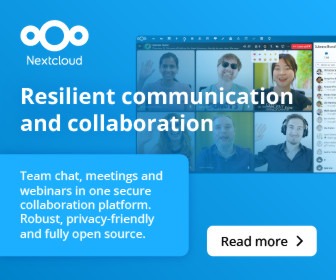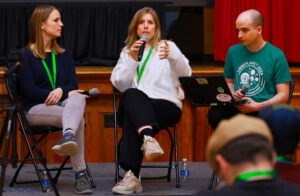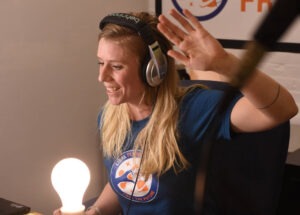The FOSS Force Interview
From what I learned talking with Jeremy Sands last Tuesday, everything about the SouthEast LinuxFest (SELF) will be marinated in southern culture. So much so that if this were twenty years ago, I’d be expecting to see geeks with cigarette packs rolled-up in the sleeves of their T shirts. But these days people don’t smoke much anymore, not even in North Carolina, a state built by tobacco money.
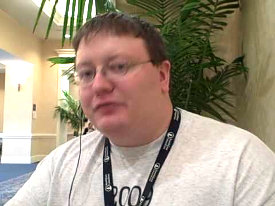
Sands has been with SELF since it’s founding in 2009 on the Clemson campus in South Carolina. He’s the main guy (he calls himself the Lead Masochist), mainly, he says because he’s the only person involved with the project who doesn’t have to punch in at work everyday. Technically, I guess, he’s the president or proprietor, but I’m not sure which — I never did get a straight answer on his official position with the fest. I get the impression he doesn’t like titles very much.
We were on the phone to get things set up for FOSS Force’s media sponsorship of the event (we’re proud to take part), and to prepare for our coverage. That should’ve taken about ten minutes tops, but we ended up talking for the better part of an hour. We talked about guns (I’m allergic to them), ham radio (I used to be one — K4ZSV), beer (I don’t drink it any more because I like it too much) and Slackware. Eventually we quit gabbing long enough to take care of the business at hand. Before we rang off, I asked if he’d have time to answer a few questions by email so I’d have a few quotes to use in an article.
It turns out that I didn’t need to write the article; his answers were more than enough to stand on their own as a FOSS Force Interview.
CH: What would you say is the main thing that distinguishes SELF from other Linux or open source conferences?
JS: To my mind there are two main things that are very different at SELF.
First, we really embrace the Southeast at SouthEast LinuxFest. We source dozens of Deep South microbrew beers to share at the event, we go to an indoor firing ranch, our speaker dinner is Western Carolina style barbecue (pulled pork, hickory smoked, mustard base sauce…you keep your [expletive deleted] ketchup off the barbecue!).
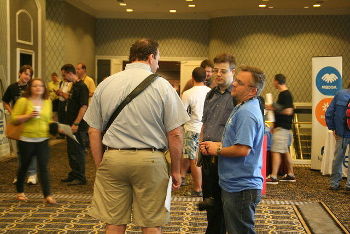
People don’t appreciate just how much good FOSS, tech, and serious economic production is done along the greater I-85 corridor. But at the rate people have been moving into the I-85 corridor, maybe the secret is starting to get out.
Second, we make sure to have a lot of fun. Most of SELF’s most loyal speakers, attendees, and sponsors say that they come back year after year for the fun. I’ll save going into detail here, as I believe I have accidentally segued nicely into the next question.
CH: On your website, you talk about SELF’s goal as part educational (or informational) and part social. Although this is probably true with most FOSS conferences, usually the social side is an afterthought, consisting of a drink fest or two at a local bar. Could you talk a little bit about the social aspects of SELF?
JS: At first with SELF, it just started out with your typical parties. It may seem simple: insert booze and geeks and happiness ensues. But it does not necessarily work that way. It can be difficult to pull off a proper party when you have to partner with a hotel or convention center to put on events, but I’ve managed to muscle myself some arm room to do some events at SELF where the venue is, to their immense credit, hands off. Nothing ruins a simple sit down to have drinks like a hotel cash only bar in some cavernous, bright, beige, willfully boring, wantonly bland, ballroom.
It is all about creating the right atmosphere and keeping fun killers at bay for the simple stuff like having drinks with friends, new and old. Beyond that, I’m slowly expanding the things SELF does socially, sort of trying a new thing I think might work each year. Last year we introduced a craft beer bottle share to great success. This year we’re going to an indoor firing range, where we have made sure to provide a professional to give ample training to our friends coming from California who have probably not yet enjoyed putting lead on target yet.
You just have to put yourself out of the mindset of talk after talk, and ask yourself what would be fun to do with a few hundred of your geek friends, and good things usually ensue.
CH: I believe that you’ve been with SELF since the beginning. How has the conference evolved over the years?
JS: Indeed. I started out as speaker coordinator in our first year, 2009, at the campus of Clemson University. Our first year I didn’t expect many people, as Clemson could be accurately described as “Bravo Foxtrot Echo,” if you catch my drift. Try getting a sponsor to pick up your event with no history, little credibility, and oh yeah, you have to fly into GSP [Greenville-Spartanburg Airport], probably off one, maybe two connectors, and then rent a car and drive into the middle of nowhere for another hour.
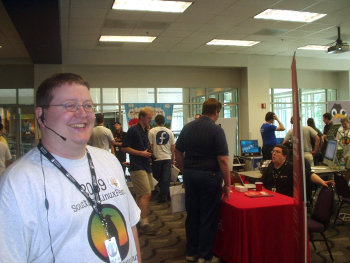
Sadly, after we attained the space, Clemson did not appreciate us using their student union when they want to do orientation. To make sure we never made it back, they booked the building, all of it, for the entire month of June, and for several years in advance. The next two years, we went to Spartanburg, S.C., and to Charlotte for the next four after that. We’ve more or less slowly grown over time, as we do better at getting the word out about our event and people keep coming back.
CH: What’s new for this year and what do you find particularly exciting about SELF 2015?
JS: This year we will be live streaming all the talks from the event for the first time. It has been quite the undertaking, both on equipment and getting a conference network powerful enough to handle that kind of bandwidth plus our attendee/staff/speaker bandwidth needs. GlobalVision, a local wireless ISP out of Greenville, S.C., are big fans of our event and really go above and beyond to deliver an outstanding conference network for us that is up in 24 hours, can handle terabytes of data at high concurrency, and be shut down and hauled away just 96 hours later. We’re going to have a page I’m calling “SELF Front Porch Mode” that has a feed with links to talks as they go live, live streaming from the expo hall from Jupiter Broadcasting, our IRC channel, our social media hashtag, and of course, a boss button for those sneaking a glimpse of SELF at work.
I’m also really excited for some of the talks. SELF has a disproportionately high amount of ham radio, Slackware Linux, Red Hat Linux, and Database Pros compared to other cons. Red Hat is an easy explanation. The others defy easy explanation. The last of those four is going to put on a show this year.
This year was easily the strongest RFP [Request for Proposals] ever, particularly on database content. My goodness, we had competing talks on common table expressions, one from the guy who wrote SQLite and one from one of the world’s pre-eminent Postgres gurus, who your company would willingly pay $10,000 for a one-on-one consultation if they needed some good Postgres training. This kind of madness was common on database topics in RFP this year. We have the release manager for MariaDB, the CEO of Percona, the community manager of MySQL, the creator of SQLite, a world class PostgreSQL trainer… It just keeps on going.
It was unreal and nearly impossible trying to decide on talks this year. I genuinely believe if you put effort into it, you could come to SELF this year knowing little to nothing about databases and leave knowing more about them than most people get in the course of getting a bachelor of computer science degree. And even if you couldn’t provide a solution to a database question, after this year’s SELF you’d definitely know specifically where to look for your answer.
CH: According to your website, last year 675 people attended SELF, which I believe set a bit of a record. Any guess on what attendance will be like this year?
JS: Fingers crossed for 1,000. I’ve been trying to get to and past the 1K hump for the last two years. From an event organizers prospective, 1,000 is a nice number where logistics, sponsorships, and more begin to work in your favor. There isn’t a lot of difference in the amount of work needed to put on a conference for 400, 700 or 1,000 people. But the bigger the pool the more volunteers, the better deals with venues, and the more sponsors you attract. Viability and efficiency are purely a numbers game when it comes to a conference.
FOSS Force will be attending and covering this year’s SouthEast LinuxFest. Watch for our coverage beginning Friday.
Christine Hall has been a journalist since 1971. In 2001, she began writing a weekly consumer computer column and started covering Linux and FOSS in 2002 after making the switch to GNU/Linux. Follow her on Twitter: @BrideOfLinux



